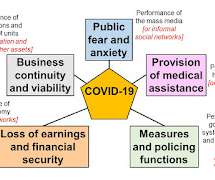Covid-19: Elements of a Scenario
Disaster Planning and Emergency Management
MARCH 11, 2020
It is now more than ten years since there was a general push to induce countries to plan for pandemics (WHO 2005). US Homeland Security Council 2005, UK Government 2008), while in others it did not. are crises which have to be managed simultaneously at several levels, from international to local. McCaw 2007.












Let's personalize your content